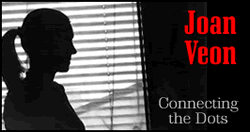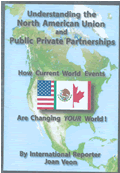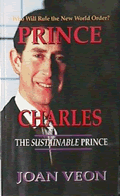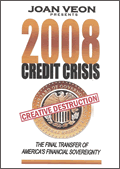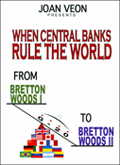WORLD GLOBALIZATION OF THE BANKING & REGULATORY STRUCTURE
PART 2
By Joan Veon
June 30, 2009
NewsWithViews.com
Concentrating Total Financial Power at the Bank For International Settlements and the Financial Stability Board
BASEL, SWITZERLAND - There are those who have been predicting a time when there would appear a world government structure. That time is here. Many, however, have predicted that it would be political in power. That is not necessarily so. Although the United Nations has been an organizing power worldwide to harmonize national law with international law, they do not issue or print money—for that is the role of central banks. With the new and vast empowerments being given to the central banks of the world and with the restructuring of the Financial Stability Board, it appears that world government is financial and economic. The old adage is true, “He who owns the gold makes the rules.”
The entire banking system of the world, with the exception of a few Muslim countries, is run by private corporations called “central banks.” America’s central bank, the Federal Reserve, was founded in 1913. People should understand that it is not Congress which runs America but the Federal Reserve because without the money and credit that it provides to banks and subsequently home owners, farmers, and businesses, would not be able to function. All one has to do is study the various past economic crises to know that they occurred when the national banking system cut off credit. There is no doubt that the 2008 Credit Crisis has helped everyone to see that it is the banks—primarily the international banks and the central banks which run the world. While the names of the shareholders of the Federal Reserve remain secret, many people believe that the large international banks are some of its owners.
As a result of the Credit Crisis, the Bush Administration proposed the “Blueprint for a Modernized Financial Regulatory Structure” which was approved by current Treasury Secretary Timothy Geithner who then was president of the New York Federal. He is now proposing the Obama regulatory blueprint. Recently released, it calls for many of the same recommendations as the previous blueprint, which can be summarized as a total centralization of power:
•
A New Financial Services Oversight Council of financial regulators to
identify emerging systemic risks and improve interagency cooperation.
• New authority for the Federal Reserve to supervise
all firms that could pose a threat to the financial stability, even those
that do not own banks.
• Stronger capital and other prudential standards
for all financial firms, and even higher standards for large, interconnected
firms.
• A new National Bank Supervisor to supervise all
federally chartered banks (and other financial institutions currently
not under Federal Reserve oversight).
• Elimination of the federal thrift charter and
other loopholes that allowed some depository institutions to avoid bank
holding company regulation by the Federal Reserve.
• The registration of advisors of hedge funds and
other private pools of Capital with the SEC.
Since most are not acquainted with our financial and regulatory structure, they will not appreciate the incredible transfer of power being given to the Federal Reserve, a private corporation. Once Congress passes the necessary law, the Fed will be given massive powers over the entire financial and economic industry, the insurance industry, non-banking institutions as well as the mortgage industry.
While most Americans are hardly aware of the United Nations or World Bank, let alone the World Health Organization, it will be difficult to understand the two-pronged frontal attack: changing U.S. regulatory laws to correspond to global regulatory laws which are in the process of being strengthened and re-configured. The complexity is enormous and the areas affected are hardly known or at this time or truly understood. Sadly, Congress is so busy adjusting their togas, they do not understand that they no longer have the real power as it was given to the Federal Reserve in 1913.
A very major piece of the new international architecture is the newly configured Financial Stability Board-FSB. At the spring meeting of the IMF/World Bank, NWV had asked former BIS Managing Director, Sir Andrew Crockett, now with JP Morgan, what the role, power and function would be of the FSB. He explained that while the chairs were still being arranged at the table, that it would act at the global level to oversee national stability risks, it would work with other regulators, it would review standards set by various board on the national level, and it would employ a ‘college of regulators’ that would define methodologies. At the inaugural meeting held on June 26-27 in Basel, FSB Chairman Mario Draghi, Governor of the Bank of Italy, provided a detailed report on its new structure. He explained,
The FSB’s mandate is to assess vulnerabilities affecting the financial system; identify and oversee action needed to address them; promote coordination and information exchange among authorities responsible for financial stability; monitor and advise on market developments and their implications for regulatory policy; advise on and monitor best practice in meeting regulatory standards; undertake joint strategic reviews on the policy development work of the international standards setting bodies; set guidelines for and support the establishment of supervisory colleges; manage contingency planning for cross-broader crisis management; and collaborate with the IMF to conduct Early Warning Exercises.
The FSB was given an official “plenary” structure which would be like the structure of any other international body, like the plenary of the United Nations. It will be comprised of G20 central bank ministers, treasury secretaries, and regulatory authorities. It will have a Steering Committee and three Standing Committees: for Vulnerabilities Assessment; Supervisory and Regulatory Cooperation; and Standards Implementation.
The Standing Committee for Supervisory and Regulatory Cooperation will address coordination issues that arise among supervisors and regulators and set guidelines for and oversee the establishment and effective functioning of supervisory colleges.
A number of questions have been raised with regard to the college of supervisors which will be a key component of the FSB. In April, 2008, the G7 welcomed the idea of the college of supervisors to make the world’s financial markets less risky. Paulson’s blueprint and his recommendation to bring all of the different U.S. regulatory bodies under one agency is key to making the supervisory colleges work. Many on the international level wanted to be the one responsible for suggesting it, Gordon Brown of the UK being one of them. The supervisory college would monitor the world’s top 30 financial firms in order to have “effective cross-border supervision.” This would be formally agreed to by Memorandum of Understanding which would describe how it will function, be organized and coordinate between supervisors, banks, and countries.
The
FSB will be comprised of the Group of Seven plus: Argentina, Australia,
Brazil, China, Hong Kong SAR, India, Indonesia, Korea, Mexico, Netherlands,
Saudi Arabia, South Africa, Spain, Switzerland, and Turkey. In addition
the European Central Bank and the European Commission, as well a host
of international financial institutions and international standard setting,
regulatory and supervisory groups with participate.
The above constitutes a total restructuring of the entire financial system,
mortgage system, insurance industry, non-banking institutions, and any
other entity connected with money on a worldwide basis. While the central
banks control the monetary system, they are now being given complete centralization
of these financial powers. Congress can argue about whether or not they
will put all of our regulatory agencies under one roof, but the real truth
is that they don’t have the power to do that for “he who owns
the gold makes the rules.” The Federal Reserve, along with Treasury
has already been playing a major role to help set in place the new financial
and regulatory infrastructure.
In short, what comes after this will probably be a global currency that will lead to a time of total control under a cashless system. The BIS would not answer NewsWithViews' questions about a change to the Special Drawing Right from the dollar. BIS Managing Director Jaime Caruana commented, “Repairing the financial system and building a more resilient one for the future also requires broad-based efforts involving cooperation between government and the private sector. At the same time, we need to resist the move towards protectionism; mounting that resistance puts a premium on international cooperation and a heightened sense of shared responsibility.”
|
Subscribe to the NewsWithViews Daily News Alerts! |
It is ironic that here in Basle, the home of the Bank for International Settlements, the Rathaus, built in the early 1500s which was the center of town at that time, has written in gold a statement that is timeless, “Freedom is better than gold and silver.” For part one click below.
Click here for part -----> 1,
� 2009 Joan Veon - All Rights Reserved
Sign
Up For Free E-Mail Alerts
E-Mails are used strictly
for NWVs alerts, not for sale
 Order
Joan Veon's book;
Order
Joan Veon's book;
"The
United Nations'
Global Straitjacket"
Joan Veon is a businesswoman and international reporter, who has covered over 100 Global meetings around the world since 1994. Please visit her website: www.womensgroup.org. To get a copy of her WTO report, send $10.00 to The Women's International Media Group, Inc. P. O. Box 77, Middletown, MD 21769. For an information packet, please call 301-371-0541
E-Mail: t7w7g7@aol.com
Website: www.womensgroup.org

